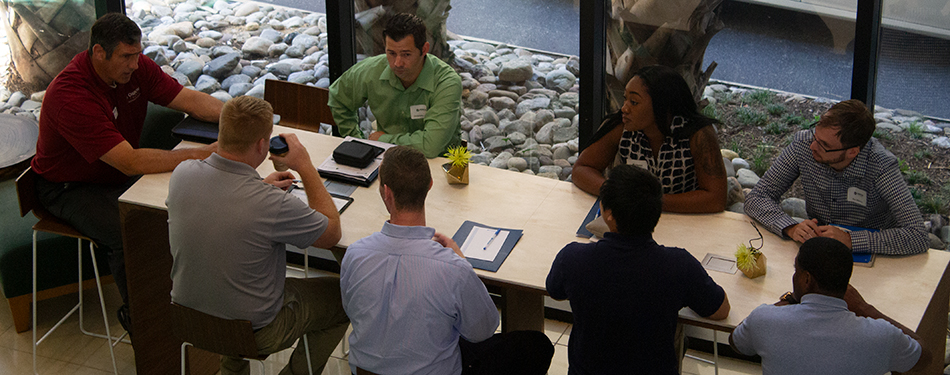While headhunters and recruiters may seem synonymous, there exist many differences between the two career fields, which not only vary in their approach to a candidate's job search, but can also be the difference between a successful career search and a struggling one.
Read on to learn the difference between headhunters and recruiters, and how a military recruiter at Orion Talent can help you find a job and make your military to civilian job transition a smooth process.

Recruiters are similar to headhunters in that they work to understand what motivates a candidate, but they do not recruit candidates out of a targeted industry - in the case of the recruiters at Orion Talent, the military. Recruiters provide advice and guidance to help those finding a job to be able to begin a career, and are usually involved in more than just the initial contact of the hiring process.

Headhunters work in a variety of industries, and are most common in the corporate, sales, and engineering fields. While they can work in headhunter firms, many headhunters work alone. Headhunters traditionally work with a "passive" candidate, or a candidate that may not be seeking new employment. A headhunter finds potential candidates by targeting industries that are similar to their client's, calling employees that are in that particular career field or position.
Typically a headhunter works with candidates that may or may not seeking employment, and are more interested not in a candidate's employment status, but if they are a good fit for the position their client is trying to fill.
As a result, a headhunter engages the potential candidate to see if they would be open to a career move, and attempts to sell them on why they should consider a change (most specifically, to their client). Headhunters are only involved in the initial finding stage of the hiring process, and do not have a presence in any additional part of employment.
A good headhunter or recruiter is worth their weight in gold - and can very well be the reason that you discover a quality career with excellent earning potential that you wouldn’t normally have the opportunity to interview for. Headhunters and recruiters can expand your search in the job market, help you focus your search, and serve as your advocate with a potential client. Some qualities to look for in a good headhunter or recruiter include:
There are a variety of ways to connect with headhunters and recruiters to help you find a career, including:
For those looking for a job after the military, the biggest difference between working with a recruiter at Orion Talent versus a military headhunter specializing in veteran recruiting is that Orion specializes in military transition, most specifically jobs for Military Officers, Junior Military Officers (JMOs), Noncommissioned Officers (NCOs), Navy Nuclear-trained Technicians, Enlisted Technicians, and Combat Arms Personnel.

"The key difference between recruiters and headhunters is that recruiters typically have access to many openings while a headhunter is usually sourcing for a single job," states Jericho Urmenita, Orion Recruiter.
"Working with a recruiter is like having a real estate agent for your home search: tell them your dreams and they will work with you to maximize your search criteria in their large portfolio of listings. Here at Orion Talent our recruiters, who are also typically prior military, know your background and know how to maximize your talents in the current market. We will work with you to find a match for the pay, location, type of job and industry you desire," Jericho explained.
"Working with a headhunter is like answering an open house ad on your own," he continued. "You only have access to that one house. Headhunters are typically sourcing for one opening and usually are not there to help you for any other options should you not fit the opening they have."
The military recruiters at Orion Talent are a great tool for veterans and those transitioning from the military. They can offer guidance through a very stressful and difficult process, provide recommendations on career fields that may be overlooked, and offer resume and interview preparation services.
At Orion Talent, we'll work with you to find the perfect civilian role. We're experts in post-military job transition, with hands-on experience and world class expertise in connecting veterans with jobs that leverage the unique and valuable skills and experience that you gained while serving.
Military to Civilian Examples for Each Branch of the Military →
Looking for a successful transition? Orion's military to civilian career transition guide can help with that!
Download Now ➔
Stay up to date on the latest opportunities, advice, hiring conferences, Orion news, and more.
Subscribe to The Hunter ➔
Enter our monthly drawing with each referral!
Help a Friend ➔
Whether you have two years or two weeks before you leave active military service, get the tools you need to be ready to succeed in your civilian career.
Start Today ➔
Are you an active duty Military Technician or NCO? Get the tools and make a plan to succeed in your next career.
Learn More ➔
Let us know you are ready for your next career by doing these simple steps:

Registering will allow you to search and apply for jobs, access our career recruiters, and seek resume assistance.
Register Now ➔

Login Here to update your information and upload your resume. This will engage our recruiters and let them know that you are ready to find your next career.
Update Your Account ➔

This sampling of our available jobs is a great place to start after creating your account.
Search Jobs Now ➔